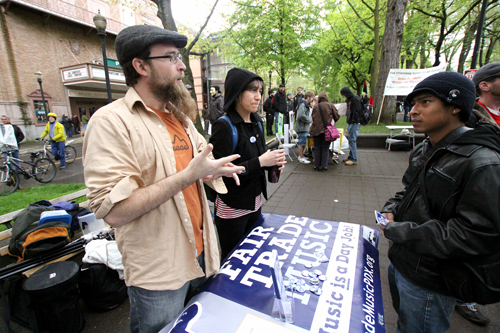Fair trade is a term many people have heard in reference to coffee, clothes or other tangible goods. The Fair Trade Music campaign brings that idea of fair wages for products into a new realm—livable wages for the service, of providing music. The campaign was started in Portland a handful of years ago, and now, with the support of the Musicians Union, Local 99, it has begun to raise awareness of the importance of venues paying musicians a standard wage.
A fight for fair trade music

Fair trade is a term many people have heard in reference to coffee, clothes or other tangible goods. The Fair Trade Music campaign brings that idea of fair wages for products into a new realm—livable wages for the service, of providing music. The campaign was started in Portland a handful of years ago, and now, with the support of the Musicians Union, Local 99, it has begun to raise awareness of the importance of venues paying musicians a standard wage.
The campaign is not something designed to put venues out of business but, as coordinator Jake Pegg said, a way to adequately compensate musicians for their work.
“The main goal is to support the creation of great music by establishing a minimum wage for musicians,” Pegg said.
He said the campaign is focused on improving the relationship between venue owners and musicians so a smooth and fair business transaction can occur.
FTM hopes that, in the future, Portland venues will agree to their sliding-scale method of payment, with smaller-scale venues such as coffee shops or restaurants without bars paying less than a club charging a cover and offering a full bar.
FTM supporter and musician Simon Lucas said that the campaign is not focused on nationally touring musicians who have their own managers but, rather, the local bands working their way up and working for a daily wage. He said that this especially applies to university music students, so that they can graduate educated in both the talent side and the business side of music.
“Musicians should be paid a fair wage so that they can spend their time making music for people to enjoy,” Lucas said. “I think some people don’t realize what it takes to really play an instrument well. It takes thousands of hours of dedicated practice and proper instruction from good teachers. Quality instruments and good teachers don’t come cheap.”
FTM Co-chair Graham Smith-White has been involved in the campaign for three and a half years, focusing mainly on community outreach and partnering roles with youth and the public. He said the campaign is important partially because it is fighting for the musician’s ability to sustain music as a job and not let it become a hobby.
“It adds an element of transparency to the music scene, which will benefit everyone. It aims to support the whole scene: bands, fans and venues. It doesn’t discriminate by style or audience,” Smith-White said. “It’s sort of a road map for how to begin making a living as a musician, in a way. It’s also a response to over 30 years of backslide in wages for musicians, so it’s long overdue.”
The campaign is centered on three key elements: education, advocacy and recognition. Smith White said the education element is about reminding the public that musicians are professionals and their work deserves adequate compensation; advocacy is the fight for living wages and recognition of the local people and businesses that support FTM.
Pegg commented that the campaign strives to erase the concept of what he calls “the myth of exposure,” or the idea that a musician should agree to a gig because of promised exposure to the public without the venue agreeing to compensate that musician in any other way.
“Musicians are awash in a red sea of misguided cultural values,” Pegg said. “We can part those seas, but we’re not Moses. We’re just the people handing out buckets. We all have to start bailing water if we want to see the music improve.”
Interested members can join the campaign by visiting fairtrademusicpdx.org or facebook.com/Fair.Trade.Music.
Disclaimer: The Fair Trade Music campaign is currently acting as a community partner for reporter Rosemary Hanson’s community development colloquium project.







